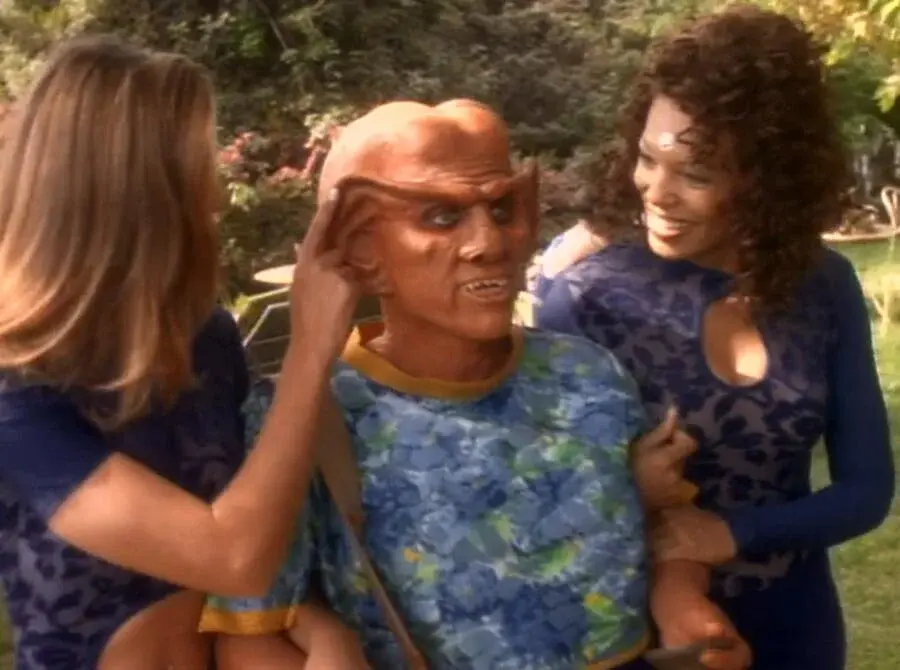I feel the same about the early (home) internet (years 1994-1999). Adverts if they even existed on a page were just a few lame gifs on a page. IRC and usenet were the “social media” of the time, except no-one called it that. Almost everyone online was as much of a geek as you (except AOL users), because the hoops to get online were significant enough to keep most normal people away. Businesses were convinced it was a fad, so didn’t get too involved.
It was basically universities, students and a handful of modem owners that could get a TCP/IP stack to work and write a login script (ppp was quite rare in the beginning).
Rose-tinted glasses? Maybe, but there’s a lot not to like about the modern internet.
Stop, you’re making me cry.
I set up one of the first Echomail and Fidonet nodes in my country and was pretty active in the days the internet started. It was such a community effort, and seeing people start to grab hold and use it was a complete rush. To see what it turned into is utterly heartbreaking, but I guess it was predictable.
I see everyone talk about how we need to drive Linux adoption, and I get scared as fuck about what that would mean to Linux in 20 years. I don’t want to see that community vaporize the same way.
I loved the old BBS community. I used to run an Amiga based BBS (also on Fidonet, I would say my node number, but it can still be looked up today, and we used real names so…). One day I had a drive failure and lost pretty much everything. No problem, said another Amiga BBS operator in my city. Bring your new HDD over and we’ll copy over my downloads folder.
I think there’ll always be weird nerds getting excited about niche things. It’s exhausting to have to keep finding new spaces, but to some extent, I think that’s our lot in life: we’re like lyme-grass growing in sand dunes — pioneer species that grow where other things can’t (or won’t), putting down roots so other things can grow.
Unfortunately, the pioneer grasses can’t survive indefinitely in the communities they build; their existence acts as a windbreak and encourages more sand to settle, causing the sand dune to form quicker than they can grow, eventually being smothered by the dunes they helped established. They have to find somewhere else to grow, somewhere new — the sand dune of tomorrow. That’s why, when there’s a series of sand dunes at a beach, you see a sort of progression, moving from more established sand dunes to younger ones as you get closer to the shore.
Maybe in 20 years, Linux will be unrecognisable to us, and maybe that space will no longer be home to nerds like us. But we’ll always find something new to be excited about; the community won’t be vaporised, it’ll just be rejigged a bunch, as we discover new areas to put down roots. That is sad, but I think the alternative would be sadder, in a way. I don’t mean if Linux doesn’t become widely adopted, but if people stop trying to push for that — at the core of this movement/community is a bunch of people saying “hey, look at this really cool thing I care about”.
It’s easy to blame the Marram grasses for crowding out the early pioneers, but we do this to ourselves, by building tools for others to use, and working on outreach. In a way, that’s how we survive, because our community relies on people who are excited about building something new in an unexplored problem space; more gatekeepy communities may maintain their “ideological purity” for longer, but they inevitably die out.
It sucks to feel crowded out by the masses, but there’ll always be new spaces for people like us, because we’re good at building and tinkering. After all, look at where we are right now. Lemmy isn’t especially radical or new, but the atmosphere here is incredibly different to Reddit. I’m way more likely to find thought provoking discussions like this thread, for example, and to care enough to write comments like this.
Amateur radio is still somewhat like this, but nothing like it used to be. That used to be the ultimate nerd hobby. My dad was a ham and I eventually got my license, but I don’t find it anywhere near as fascinating anymore. But it was the original opensource project, and you used to share info on the hobby over the airwaves coming out of the machine you built by hand.
Bill pay. Maps. Wikipedia. Every Song Ever. Every Movie Ever. Every re-run ever. Almost all the games. Communication about weird hobbies with people across the globe. Email your favorite author or artist directly. Free e-books from 5000BC to 1935 AD. Online tickets for travel. Online shopping. Podcasting. Online music collaboration.
Postal mail still a thing.
There is a lot to like about the contemporary internet. Perhaps people are less grateful now.
Well. I think it might be worth checking again what I wrote. I was quite clear in that I said there’s a not lot to like, not that there’s nothing to like. If I didn’t get anything from the modern internet, I’d not be here posting these comments.
I’d like to pull you up on the point about free e-books. Project Gutenburg was in its second decade by the time most home users got online. So that’s hardly a contemporary internet exclusive, it’s almost as old as the internet itself. Also, communication about weird hobbies is certainly not unique to the contemporary internet. We just did it on open services not controlled by corporate entities. Corporates that only run the service in order to sell your data.
As for a few of the things I don’t like? Well. Ads everywhere (including those containing malware), constant hacking attempts for anyone running a server (ssh/sip/www very commonly hit with some protocols getting 100+ hits per second), AI crawlers scooping up the whole internet without any care about how they impact transit fees or user experience, licensed purchases (streaming services, games, etc that can be taken away at a moments notice with zero recourse for the user), terrible user agreements for EVERYTHING especially regarding privacy with no way to reject since ALL companies offering similar services have the same damned agreements, subscriptions on everything everywhere and increasingly so, having to click to reject cookies everywhere and knowing they’re still building a profile about me whether I like it or not just in order to throw more adverts my way.
“every re-run ever” - except when streaming platforms decide to delete stuff forever arbitrarily, because they give zero shits about preservation.
That’s what piracy is for
Dude in that era accessing the internet was incredibly easy.
Most big ISPs had floppies or CDs you could take (for free!) that included their software (for Windows, at least) that pretty much did everything.
After Windows 95 came out, with Dial-up Networking right out of the box, the ISP software was no longer needed. There were instructional documents, and if you could follow directions, you could get online pretty easily. This made it a lot easier for small independent ISPs to start up.
That’s what we need again. The independent ISPs. It was easy for them then because the phoneline pulled double-duty. I do wish we could do that again…separate the infrastructure from the provider, have a municipal fiber provider and a free-market for Internet services over the fiber.
People don’t know how to follow basic directions though. I don’t know if that’s a recent phenomenon or not. I’m nearing 40 (and rather cynical), but still feel I’m too young to really remember what it was like in the before-times.
What got hard was trying to get your modem working in Linux. Especially if you were unfortunate enough to have bought a Winmodem.
Bruh if you lived in a rural area you might have not got dial-up until the mid 2000s
AOL did, and the others that were easy (compuserve etc) provided their own limited interface to a curated Internet.
Most providers (at least here in the UK) that provided actual tcpip did so using slip and a login screen. Which generally needed a script to login and then chain on slip to connect it to the local stack.
It wasn’t until 1998 or 1999 there was widespread use of ppp and the windows 98 dial up networking could get you straight in. Then in the UK we had services like freeserve which provided simple ways to connect.
I do wish we could do that again…separate the infrastructure from the provider, have a municipal fiber provider and a free-market for Internet services over the fiber.
What is absolutely hilarious about this is that most European countries have this as well as a lot of other countries. It’s just the US that is overrun by corporate owned broadband.
Anyone has one of those lists? Can we move these memes to peertube or something?

The ancient legendary YT meme that Anon has as his profile pic is Leek Spin by Xyliex, created 18 years ago! I think it also popularized the Levan Polka as a meme song staple long before it’s revival with Bilal the street drummer/cat vibing video.
And luckily it’s already on archive.org so we’ve got one down!
I can hear that!
It’s the Ievan Polkka, “Ieva’s polka” where Ieva is a Finnish/Baltic variation of the name Eva.
Mu isamaa, mu õnn ja RÕÕM!!
Mine too (well, not my country but my joy, yes. What a beautiful and chill and foresty country. I miss it immediately when I leave.)
no way, another estonian.
I’m not Estonian, sorry, but I like to visit. It’s a beautiful country. I immediately recognized you by the õ 😄
Profile pic, good one.
https://m.youtube.com/watch?v=8fvTxv46ano
AYBABTU is Lord!
Do not cite the Deep Magic to me, Witch! I was there when it was written.
But they were all of them deceived, for another meme was made. In the land of YTMND, to the music of Three Six Mafia, the Edge Lord forged, in secret, a meatspin meme to troll all others.
And into this meme he poured his cruelty, his malice and his will to dominate all life. One meme to rule them all.
This didn;t aged so well…
4chan doesn’t have profile pictures. That’s the image anon posted
Kinda sad that it’s almost never mentioned that this is just a scene with Inoue Orihime from Bleach.
I miss the 2000s…
I miss the 90s. Browsing the web (we’ll, few sites) at 33kbps with Voyager browser on Amiga… 😀
Please, stop… I can only take so much
Playing Warcraft with a buddy by having the game call them on their phone line.
HOURS just typing [randomword].com and seeing what came up.
my knees hurt
Luckily for it’s just my right big toe knuckle.
Great now I have leekspin/levan polka stuck in my head. Thanks OP
Let’s see if it works the other way around too:
What do you see when I say:
‘You spin me right round, baby Right round like a record, baby’
you are officially gay :-)
Took you for a spin, didn’t I?
That was
There’s plenty of new good stuff on youtube still. Just a lot more junk as well
“I’m old” vs “I MOLD”
I like the latter more, said like Dr. Weird.
I didn’t realize it was supposed to be “I’m old” until your comment
Same here - and i like “i mold” a lot.
Actually it’s iMold, and electronic jello mold with a touchscreen developed by apple
i thought it was L mold, as in the way memes what have gone through a lot of “right click save” cycles have the jpeg artifacts described as mold, and that it was somehow lame
I knew it was “I’m old” just because I remsmber the old Fucki Mold joke…
Umm annon that was not the wild web. The wild web was in the 90’s and early 00’s. That was truly the wild web.
Nah I think they’re more or less right. I’d maybe pull it back 3 or 4 years, but not as far as 2004.
What killed off the old wild web was the popularity of centralised platforms. Facebook (open since 2006, really started taking off more around 2008/9), YouTube (first video 2005, really takes off from 2007/8), and Reddit (self posts first allowed in 2008), and other things like that which were admittedly great for allowing more people to share their creations with the world, but we’re disastrous for the open web, because they killed off independent blogs, forums, and other smaller websites.
So it sounds like the Internet died in 2008.
I would say it contracted a terminal illness at some point around 2006±1 and went into palliative care in 2008±1, but didn’t fully die for another 5ish years. The death of Google Reader seems a good landmark to use, since RSS was a really helpful tool that became less necessary as sites became more centralised.
Right about with the uprise of the smartphone i guess
When people without computers were let loose onto the web.
Not me browsing this from my phone app, no siree.
It’s true that my original comment was also from my phone haha.
MySpace was huge before Facebook, and it killed off a lot of blogs. Late 90s and early 2000s were truly the wild web IMO. I had a geocities page with its own forum before MySpace made me abandon it due to inactivity.
Webrings, RSS and dedicated blogs and forums were how we got around, Alta Vista would give you 1-2 relevant links eventually (after digging thing keyword spam) and then you’d follow the clues and links from each result and eventually strike gold. It was a skill that gate kept certain areas of the web, but in a good way.
But google was pretty awesome before it enshitification, same with Reddit and instagram (pre Facebook takeover).
We need a good non-profit search engine that can re-open the independent web that’s still there under the spam somewhere. But it sounds about as likely as overhauling the us election system, or reigning in capitalism in any way. Hard and expensive to rich people.
Googling CD Keys, Torrents and Cracks was easy back then. DC++ was the way to go and Limewire was not yet Infested with CP and Viruses. There was a sweet spot but only for 2 years. After that, the golden age of Piracy with the File-Hosters came and Reddit wasn’t shit.
If I have to pinpoint the timeframe: When 4Chan got really unironic racist (and the Stromfront forum leaked to the rest)… oh and Facebook…
Oh man, we had DC++ semi-officially endorsed by the inter-college IT department at my university in 2013/14. It was fantastic, especially since in my first year we only got 5 GB of data per month (with a large number of unmetered sites, including anything from Google), so without the unmetered file intranet it’d have been really hard to manage. Unfortunately as they increased the data caps it killed the popularity of DC++, which ended up getting killed off not long after I left.
Too many beheadings in the wild web. But yeah, those years were really the wild web.
I remember watching saddam hussein hanging video when i was 12, good times
Ya, I remember the first time I went on rotten and my young mind was not prepared for it. Honestly I miss the good old days when the most shocking thing was lemonparty and tubgirl.
I met this lady at a party a few months ago, her cap immediately gave her away as a sane human being. We had a chat about the good old times :D

Don’t forget about the goatse man
No, that one is burned into my eyes forever.
This sounds fucked but my mom actually was showing me these videos lol
Ah the good old “korn_music_vide.wmv” that immediately cuts to someone in an orange jump suit on their knees.
Korn really getting intense with the new music videos
We can make it anew! I feel like Activitypub and federation has given us the tools to revive the old internet, made by our own hands.
I’m working on a decentralised sharing protocol, so that anyone can have their own website, I just have to find some people interested in testing it out 😊
That sounds super interesting! Can you link me/tell me how that works networking wise at a high level? I’ve been poking at a number of distributed compute and decentralized software lately just because every single one has its own unique solutions to the various chicken/egg problems that decrentalization pose
Okay, so in the most simple way, the protocol is based on “I share yours, and you share mine”.
That means you run a little node connected to the internet, sharing other peoples “things” (it’s all encrypted so you don’t know whatever it is) and their nodes share your website. Add oversharing (you share say 10 different data from 10 different nodes, and they all share yours) and you have a robust presence too.
You can then share your website with a simple link.
I say website but you can share whatever you want, daily information, backup things, your holiday photos, anything really.
You can check it out on https://tenfingers.org (some more technical information can be found in the whitepaper available there too). There is a fully functioning implementation BTW.
Would you mind sharing what those chicken and egg problems are? To see if I navigated them well :-)
If you have any questions, I’ll be happy to do my best to answer them ofc.
Awesome name! And even more awesome concept! Will test it out first chance!
Thank you!
I set up a sub at lemmy.mindoki.com/c/tenfingers if you want to share how it went… Or if you have questions and whatnot ofc :-)
The internet is now just a bunch of segregated echo chambers.
It always was in a way. In the early days only people with interest in the technology went online. Then, in the forum era, people found their communities and stuck with it. Only because of the rise of social media were suddenly all people on the same few platforms, which is now naturally splitting apart again into groups, subs, feds, etc
We live in an internet.
Yeah, if used to be people made a comfortable living and if they had the time, shit posted on YouTube. Now to have time to make YT content you have to try to make a profit from it.
Anyone remembers Z0R or P0WN ??? That was ART, killed by the discontinuation of Flash. I archived all of this and in 40 years I’m doing a Gallery in the Metaverse.
Used to love z0r. Oh man, nostalgia hits hard.
How did deep fried memes become a thing? We really will jump on any bandwagon, won’t we?
Now I dont feel too well.
you dont miss old roblox, you miss having fun , a Roblox YouTuber
Exactly like this.
Veteran internet people sometimes go on about everything was smaller, different, blah blah blah, but I do always smell some sort of a nostalgia bias in their coments. Sure, there was some things that are better compared to now, but this is normal! Every decade has its ups and downs, and while not everything is perfect, you can’t forget the improvements that happened since then.





















